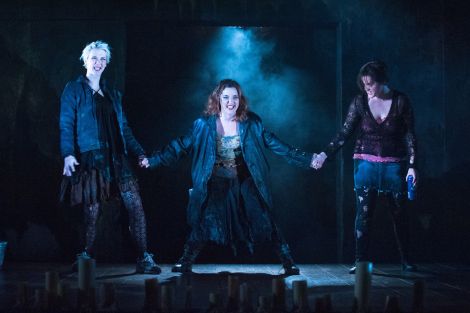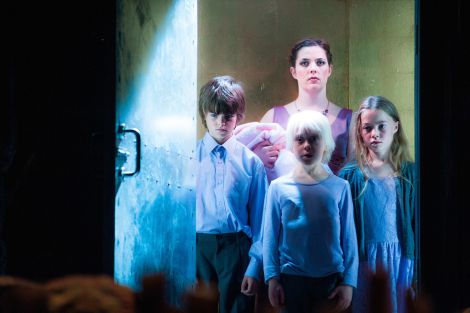Reviews / Review: Blown away by a masterful performance
After struggling through the first act, Shetland News reviewer Kathy Hubbard came away full of praise for Scottish Opera and their adaptation of Verdi’s opera Macbeth performed at the Garrison Theatre on Wednesday night.
First, a pre-emptive apology; once more, this Esteemed Organ has dispatched me to write a review of something about which I know very little, and all my attempts at palming it off onto someone who does know their stuff were in vain. So I’m craving your forgiveness – or at least your forbearance – from the get-go.
Scottish Opera’s touring company was at The Garrison Theatre on Wednesday night doing a performance of Verdi’s Macbeth. Let me start by saying what a treat it is for so many of us to see and hear music performance of this calibre here in Shetland. Long may our national companies keep visiting us, and long may the funding that allows that to happen continue.
The quality was in evidence from start to finish. Placing the action in a stark bomb cellar invoking the devastating civil wars in the Balkans, the set immediately let you know that what was coming next was not going to be pretty.
The lighting was superb and used to powerful effect throughout the performance, especially the shadow work. And the singers were absolutely marvellous – not a less-than-wonderful performance anywhere. Singing solo or ensemble their delivery was inspiring, thrilling and often spine-tingling.
They all had impressive stage presence to support those voices, with Thomas Faulkner’s Banquo as the stand-out performance for this reviewer. That man could walk on and sing the telephone directory and still be enthralling.
Catrin Aur as Lady Macbeth, David Stephenson as Macbeth, Anthony Flaum as Macduff gave it their all (and their all was massively impressive) whilst the witches Marie Claire Breen, Sarah Shorter and Laura Margaret Smith triumphed over some of the bizarrely jaunty music they had to contend with.
Become a member of Shetland News
And herein lies the rub, for me – the opera itself. Now I like opera well enough, although I sometimes can’t eat a whole one. But I love Shakespeare’s Macbeth. I mean I REALLY love it, heart and soul. And although I know that it was naive of me to come to an opera whilst anticipating the play, I just couldn’t help making comparisons (which are, I accept, ‘odious’) between this pared-down account of the Scottish Play and the sublime poetry which infuses the original master’s work.
Shakespeare’s poetry drives the story of Macbeth, its rhythms and cadences power the plot, the characters and the meaning, and his brilliant grasp of the essence of tragedy leads you inexorably to that single moment where the protagonist crosses the line and makes that one fatal decision that casts the die irrevocably towards disaster, and from which there is no coming back. Without the poetry, without those rhythms, and with the demands of Italian opera imposed on it, the story of Macbeth became, for me, just another tale of murder and betrayal, full of sound and fury and signifying nothing.
So I found myself struggling through the first act, trapped between intense admiration of the singing, the staging and the performances and rebelling against what Guiseppe Verdi and his librettist had done to Shakespeare’s heart-stopping play. This simply was not going to do – I knew I had to enter into the next four acts with a different attitude. This was not Shakespeare. This was an opera – an Italian opera – so get over it.
Thankfully, I did get over it enough to appreciate an awful lot about the performance. Highlights for me were Banquo’s entrance at Macbeth’s feast (hugely dramatic), Catrin Aur’s heartbreaking rendition of Lady Macbeth’s descent into madness, and the imaginative use of ghostly children to underline the tragedy at key points during the story. This was genuinely chilling and effective – the children at once victims, spectral accusers and victors-to-be as future rulers of Scotland.
Earlier I mentioned the effectiveness and potency of the lighting. One scene in particular cast Macbeth’s massive and sinister shadow on the wall, recalling the vampiric Count Orloc’s ascent of the staircase in F.W. Murnau’s classic 1921 film Nosferatu. The set was designed with a door centre stage at the back that was used to terrific creative effect. Every time it opened you were granted a moment of sheer drama that took your breath away.
Judging by the applause and the excited conversations overheard as folk exited the theatre, the audience absolutely adored this performance – and with much justification. It was a privilege to see and hear Scottish Opera and anyone would be blown away by such masterful performances and such expert technical wizardry. But whether or not the full impact and tragedy of Shakespeare can be combined with the tropes and conventions of Italian opera is open to debate, in this case at least. (Robert Thicknesse’s excellent programme notes admirably set out the parameters of that debate and reward close reading).
So let me conclude by saying a huge ‘thank you’ to Scottish Opera for being the top class company that they are. Come back soon. You were utterly enthralling. As for me, to paraphrase The Bard, say not that I loved Scottish Opera less (because I did love ’em), but that I loved Shakespeare more.
Become a member of Shetland News
Shetland News is asking its readers to consider paying for membership to get additional perks:
- Removal of third-party ads;
- Bookmark posts to read later;
- Exclusive curated weekly newsletter;
- Hide membership messages;
- Comments open for discussion.
If you appreciate what we do and feel strongly about impartial local journalism, then please become a member of Shetland News by either making a single payment, or setting up a monthly, quarterly or yearly subscription.






























































